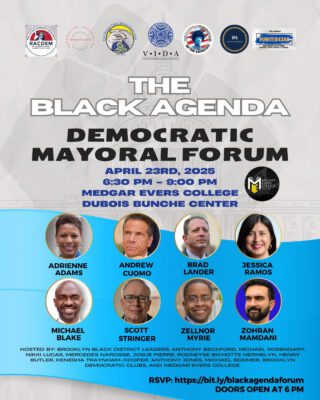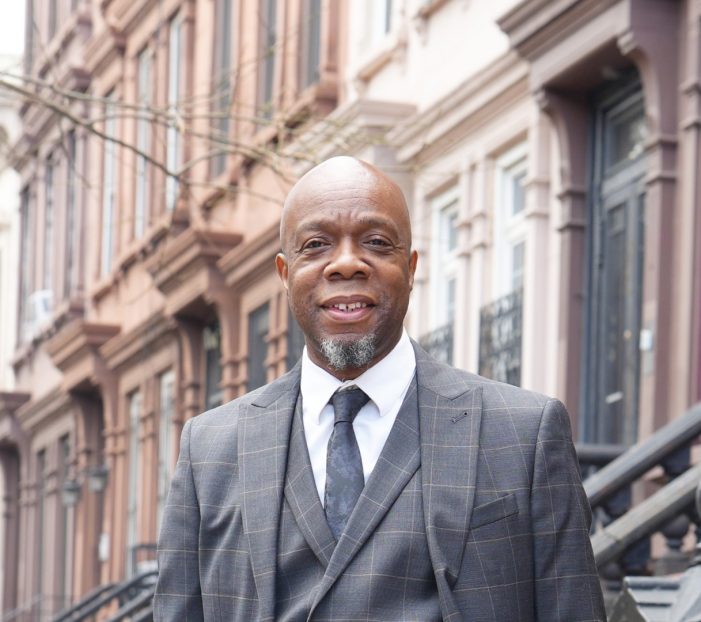By Chris Tobias | Photo courtesy of Henry Butler
Brooklyn, a borough known for its rich diversity and dynamic political landscape, is on the cusp of significant change. As we look toward the 2025 mayoral race, there are substantial shifts in the political fabric of this vibrant community. In this interview with Pearl Phillip, our Editor-in-Chief and Host of People, Power & Politics, and Henry Butler, Vice Chair of the Brooklyn Democratic Party and long-time district manager of Community Board 3 in Bed-Stuy, we get an insider’s look at how Brooklyn’s politics have evolved, how the party is addressing growing diversity, and what voters can expect in the lead-up to the critical 2025 elections.
Brooklyn Politics Today: Leading the Charge in Diversity
Henry Butler opens the conversation by emphasizing Brooklyn’s role in shaping the future of American politics. “We are leading the movement,” Butler says, citing the borough’s increasing number of elected officials in prominent positions—like the mayor, public advocate, and New York State Attorney General—all hailing from Brooklyn. He also points to the first Black woman to lead the Kings County Democratic Party as a major milestone for the borough.
Brooklyn, Butler argues, has become a symbol of true diversity and inclusion. “We are showing everyone what true diversity looks like and the strength that comes from it.” This is evident not only in Brooklyn’s leadership but also in the growing political influence of Asian communities in South Brooklyn. As the borough continues to evolve, Butler envisions Brooklyn becoming an even more inclusive political entity in the coming years.
Balancing Unity with Ideological Diversity
As Vice Chair of the Brooklyn Democratic Party, Butler is no stranger to the challenges of maintaining unity in an increasingly diverse political environment. He notes the variety of ideologies within the Democratic base, from the more progressive voices in places like Bed-Stuy to the more moderate stances found in areas like Bay Ridge and Dumbo.
Butler’s approach is simple: Brooklyn is a “big tent party” with room for all viewpoints. “At the end of the day, those neighborhoods are majority Democratic,” he asserts, acknowledging the need to respect Brooklyn’s voters’ different experiences and values. His strategy is to engage in open dialogues and devise solutions that reflect the borough’s diverse interests.
Addressing Gentrification and Equity in Brooklyn
A major issue facing many Brooklyn neighborhoods is the rapid pace of gentrification, particularly in communities like Bed-Stuy and Crown Heights. Butler, who grew up in Bedford-Stuyvesant, stresses the importance of supporting long-time residents displaced by rising costs. “We want to make sure that we are supporting policies and programs that uplift those who have been there the longest,” he says.
Butler’s personal experience as a homeowner in Bed-Stuy gives him insight into the struggle many Brooklynites face today. “We were blessed to be able to buy a home here through a government-funded program, but we know today that we wouldn’t be able to afford a home in Bed-Stuy,” he reflects. He aims to ensure that those who have lived in these neighborhoods for generations are not pushed out due to escalating property values.
Empowering Communities Through Local Leadership
Having spent years working at the grassroots level, Butler underscores the importance of community boards in shaping local policy. He encourages residents to engage with their community boards, noting that they play a critical role in securing funding for local projects and advocating for the neighborhood’s needs. “Community boards were created for the people,” Butler reminds us, and participation in these boards gives residents a direct voice in the decisions that affect their lives.
Click Here to Listen to a Conversation with Henry Butler – Vice Chair, Brooklyn Democratic Party
Increasing Voter Engagement for the 2025 Mayoral Race
One of the biggest challenges facing Brooklyn—and New York City—is increasing voter turnout, particularly in local elections. Butler is passionate about addressing this issue, especially for the Black community, which historically has shown high voter turnout in presidential elections but much lower participation in mayoral and other local races.
“We vote at a 60-70% clip during presidential years, but in local races, we’re often at just 15-25%,” Butler points out. To combat this, he and the Brooklyn Democratic Party are organizing forums and voter engagement initiatives to educate and mobilize voters. “It’s all about outreach, outreach, outreach,” Butler emphasizes.
In addition to general voter engagement, Butler and his team focus on issues specific to the Black community, including housing, gentrification, and small business support. Upcoming forums will allow candidates to present detailed policies that address these concerns, providing voters with the information they need to make informed decisions.
The Impact of Ranked Choice Voting
Ranked Choice Voting (RCV), introduced in the 2021 NYC elections, has already had a significant impact on candidates’ campaigns and voters’ engagement with the process. Butler believes that while the system has helped keep candidates in the race longer, it’s still a work in progress, especially for older voters who may be unfamiliar with how it works.
“I think people are still learning it,” Butler admits, noting that younger voters tend to embrace RCV more than older generations. While RCV was designed to make elections more competitive by allowing voters to rank candidates in order of preference, Butler believes it’s still not fully understood by many voters, especially those in communities of color.
Reflections on the 2025 Mayoral Race
Looking ahead to the 2025 mayoral race, Butler highlights the importance of local elections in shaping the city’s future. “We always say, ‘This is the most important election of our life,'” he says. But this year, with what’s happening in Washington, leadership matters more than ever on a local level.”
He encourages voters to research candidates and choose someone whose values align with theirs. “Vote for someone who represents what you believe in, not for a perfect candidate,” he advises.
Join the Brooklyn Democratic Party: Get Involved and Make a Difference
For those interested in supporting the Brooklyn Democratic Party, volunteering, or donating, Butler encourages reaching out via their official website or email. “It’s all about getting involved,” he says, stressing that district leaders are key to the Democratic Party’s decision-making process.
The upcoming mayoral forum on April 23rd, 2025, will be an important event for those looking to understand where the candidates stand on issues crucial to the Black community. Butler invites everyone to attend and participate in the conversation.

“The Black Agenda” of the pressing issues affecting Black communities in Brooklyn – including a Q&A.
Final Thoughts
As Brooklyn’s political landscape continues to evolve, conversations like these remind us that the future of democracy is shaped at the local level. From grassroots engagement to borough-wide leadership, the decisions made today will impact the lives of Brooklyn residents for generations to come. With dedicated leaders like Henry Butler at the helm, there’s hope that Brooklyn will continue to lead the way in diversity, unity, and progress.
Stay informed, stay engaged, and most of all, stay powerful. The future of Brooklyn politics is in your hands.
Want to Learn More?
- Brooklyn Democratic Party Website: brooklyndems.com
- Email: kcdemocrats2020@gmail.com
- Join the Brooklyn Democratic Party: Reach out to your district leaders and get involved today.

